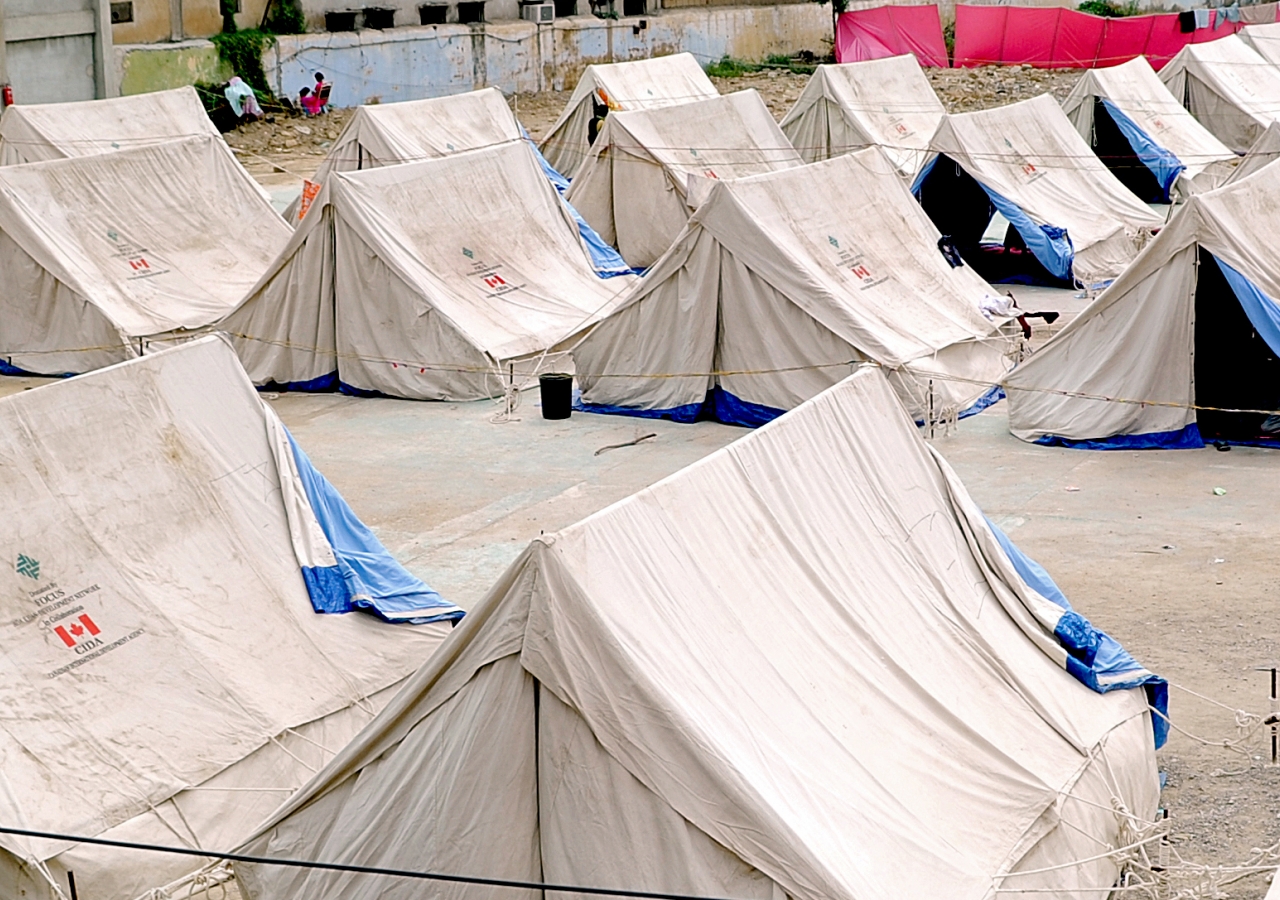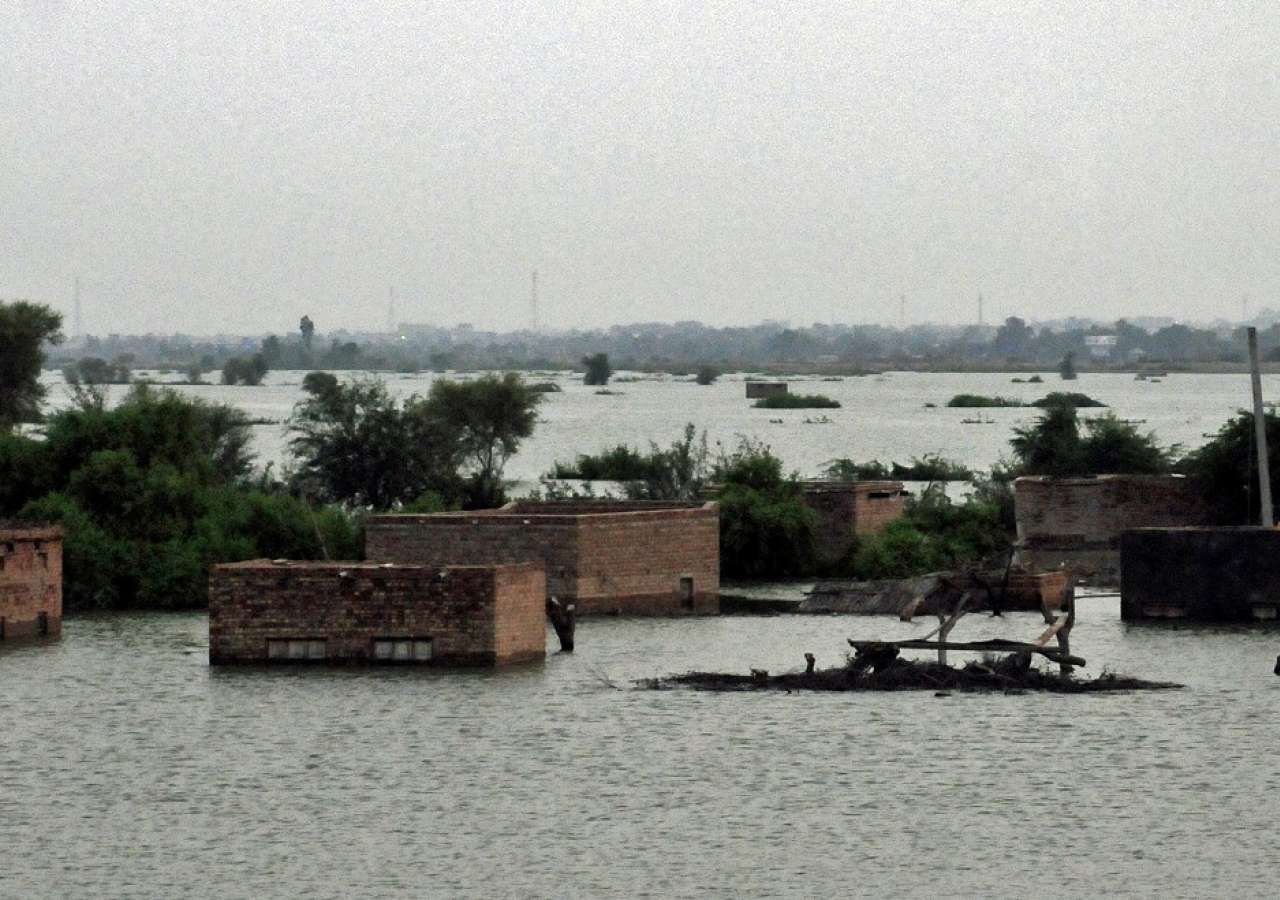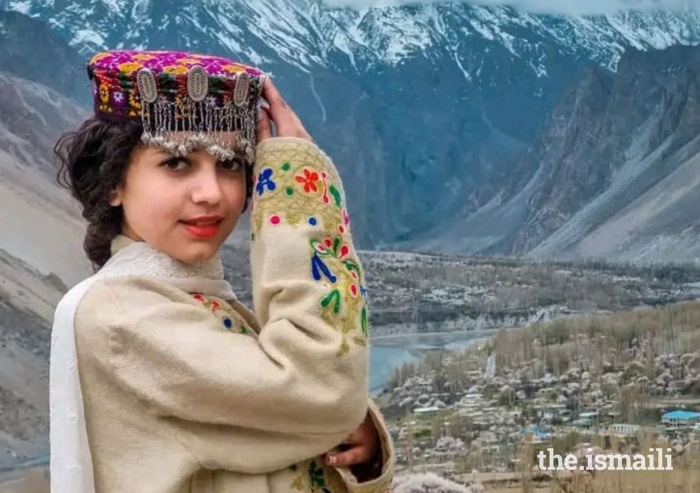It was an early August morning, and the sun gleamed over the beautiful village of Khurzgh, in Northern Pakistan. As a helicopter prepared to land, the villagers – including young children and women dressed in colourful clothes – ran towards the helipad. Their numbers swelled to the hundreds as the rotors came to a halt and the doors opened.
 Rehman Dost Khan is lucky to be alive. He and his family had narrowly escaped catastrophe by abandoning their flooding house at night. Courtesy of the Ismaili Council for Pakistan
Rehman Dost Khan is lucky to be alive. He and his family had narrowly escaped catastrophe by abandoning their flooding house at night. Courtesy of the Ismaili Council for PakistanThe seats of the helicopter had been removed to make space for relief goods. Bags of flour, mixed food packs and boxes containing cooking oil were neatly tied to the floor.
Among the crowd was 41-year-old Rehman Dost Khan and his two children, residents of the nearby Bhaang village.
“I have lost everything,” he said, the lines on his forehead narrowing in agony. “My house, all my cropped fields, the house of my elder brother – everything – was destroyed by the flood.”
That Rehman Dost Khan was alive and speaking was a blessing in itself, because the flood had struck at night and his family had narrowly escaped catastrophe by abandoning their house and fleeing the submerging region.
“We are thankful to FOCUS for bringing us the relief we needed,” said Dost Khan, referring to Focus Humanitarian Assistance, the Aga Khan Development Network affiliate that delivered a month's worth of food aid to him and his loved ones. However, he continued to worry about the future of his family. A retiree from the Pakistan Army, he had invested his pension money in the construction of fields for cropping. “We had a very small piece of land for farming, but now that is gone.”
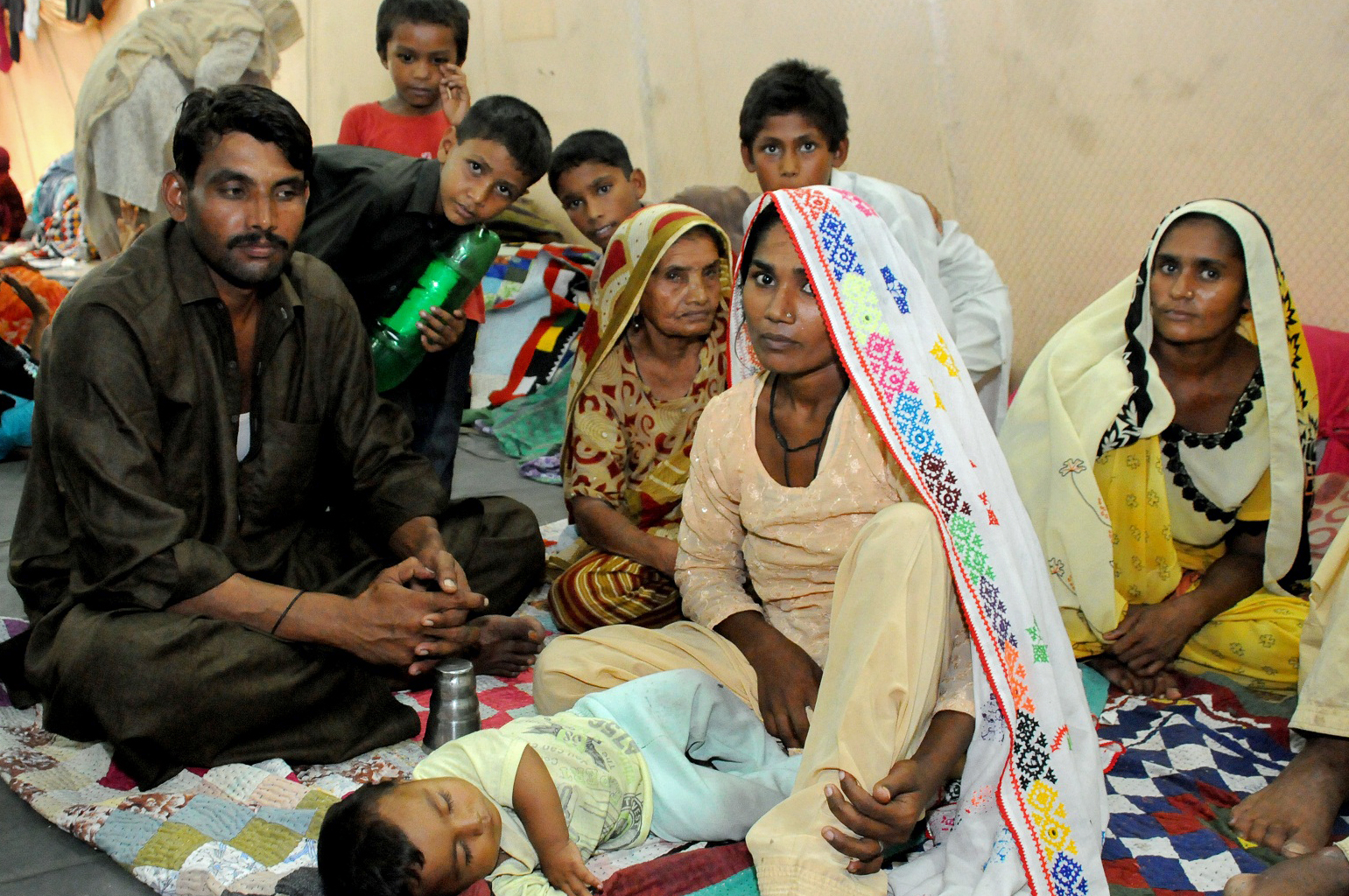 A family finds shelter from the flood devastation at a FOCUS relief camp in Sindh. Ismaili Council for Pakistan / Al Jaleel
A family finds shelter from the flood devastation at a FOCUS relief camp in Sindh. Ismaili Council for Pakistan / Al JaleelThousands of families in the region – and millions throughout Pakistan – have been similarly devastated. Heavy rains have triggered massive flooding and landslides, resulting in over 1 800 lives lost and the destruction of over 1.9 million homes, rendering millions destitute. The death toll in Gilgit-Baltistan alone jumped to 193, as two villages – in Diamir and Skardu – were wiped out by flash floods, making it the region's worst-ever natural disaster.
“The disaster has multiple implications for the future of the entire region”, said Shah Azam, President of the Ismaili Regional Council for Gupis and Yasin in the Ghizar district, during a public meeting. “Apart from the hundreds of people suffering due to the destruction of houses and burial of cropped fields, there are thousands more affected by road blockades and destruction of crops.” The heavy downpour has destroyed wheat and maize crops in Chitral and Ghizar, and might lead to severe food insecurity in these regions, according to community leaders in Chitral.
 An Aga Khan Health Service doctor examines an infant at a FOCUS relief camp in Hyderabad, Pakistan. Ismaili Council for Pakistan / Al Jaleel
An Aga Khan Health Service doctor examines an infant at a FOCUS relief camp in Hyderabad, Pakistan. Ismaili Council for Pakistan / Al JaleelThe destruction of infrastructure, roads, power pylons, hydral power stations and water supply systems, has turned securing the necessities of life into a trial for thousands of people across the mountainous Gilgit-Baltistan and Chitral regions. Many villages are accessible only through helicopters, but dark clouds and the heavy rains are hampering visibility along aerial routes, making it difficult to fly.
Nobody anticipated that the monsoon rains would cause a disaster of this magnitude – the scale of devastation is unprecedented. In Hussainabad, a village in the Shah Bundar area of Sindh, Noor Ali Hussaini and his wife, Mehwish, were evacuated. Hussaini was among the group of people who decided to stay back for a few more days as their families were shifted to Karachi. “We wanted to ensure that our property was protected and could be relocated to safe havens,” he said. But as the flood situation worsened, everybody moved to Karachi.
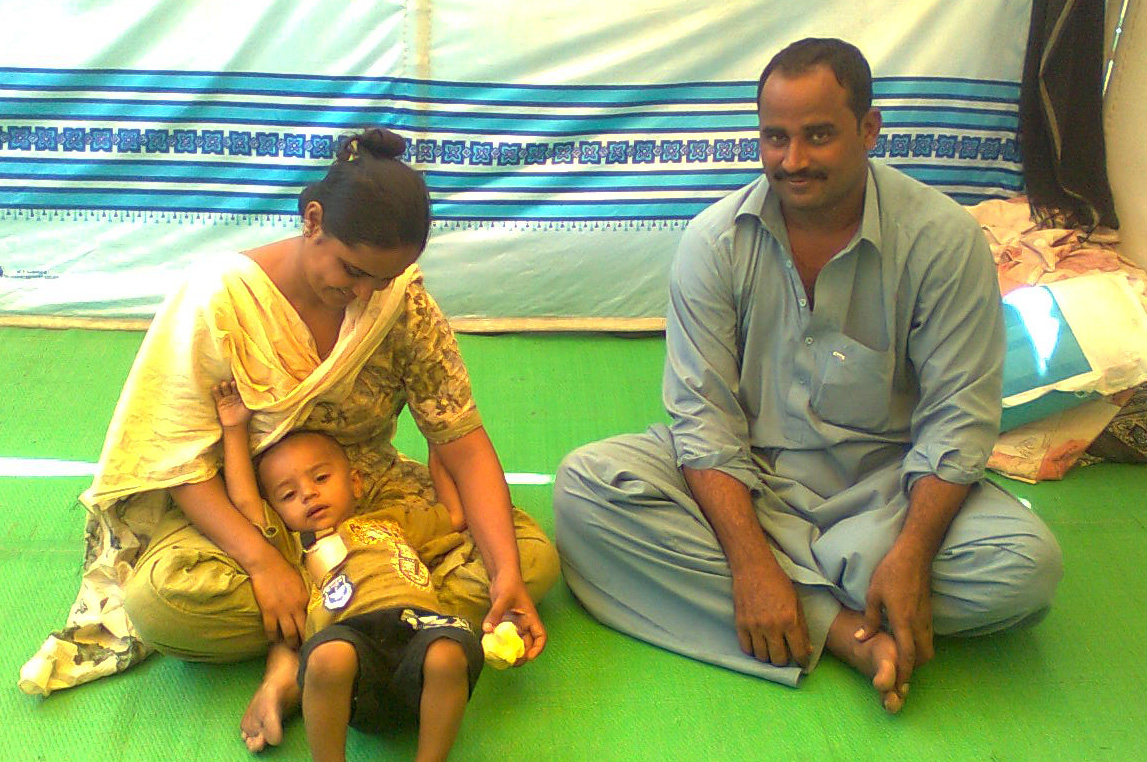 Like so many others, the Hussaini family has lost everything in this disaster, but remain grateful for the care that they have received in the wake of the floods. Courtesy of the Ismaili Council for Pakistan
Like so many others, the Hussaini family has lost everything in this disaster, but remain grateful for the care that they have received in the wake of the floods. Courtesy of the Ismaili Council for Pakistan“I was running a shop of vehicle spare parts in my village,” said Hussaini. His shop, his ancestral home, and a newly constructed house were destroyed by the flooded Indus River. “We had invested a huge part of our fortune in the house,” his wife explained, with an uneasy smile. But “the institutions and Jamat have looked after us with great care and dedication,” added Hussaini.
Despite the cloud of despair hanging over Pakistan, there is a silver lining: the goodwill among communities to help each other is immense. In the Garam Chashma region of Chitral, only women, children and the elderly remained in the villages, as the men and youth had gone to repair a flood-damaged road. Similarly, Jamati volunteers in the Ghizar district of Gilgit-Baltistan carried relief goods on their backs for miles to reach the disaster-hit villages of Hundur and Darkut in the Yasin Valley. The spirit of resilience in the face of disaster is a victory in itself.
 Ismaili Girl Guides spend time playing with the children at a relief camp in Hyderabad. Ismaili Council for Pakistan / Al Jaleel
Ismaili Girl Guides spend time playing with the children at a relief camp in Hyderabad. Ismaili Council for Pakistan / Al JaleelFOCUS, the Jamati institutions and various Aga Khan Development Network agencies, have partnered with government and civil society, as well as countless volunteers, to relieve disaster-hit communities. The Aga Khan Health Service is providing much-needed health care – including awareness sessions – to displaced individuals residing in camps in Hyderabad and Karachi. Aga Khan Planning and Building Service have made provisions for the supply of clean drinking water and adequate sanitation facilities in camps established by FOCUS, as well as working to restore water supply systems in parts of Ghizar, where many villages are without access to clean drinking water. The Aga Khan Rural Support Programme is exploring options and strategies to revive various means of livelihood destroyed during the floods.
As with all AKDN programmatic activity, the agencies in Pakistan have been serving the flood-affected population without regard to faith, origin or gender. The Aga Khan University dispatched some 50–100 multidisciplinary teams of doctors and nurses over the past several weeks, to priority areas across Pakistan identified by the United Nations and provincial agencies. Leveraging the University's strengths in medical care and community health, the teams' primary focus was on women, children and the elderly, as their regular problems have been compounded by flood-related health risks.
 Water and sanitation facilities at many flood-relief camps have been constructed by the Aga Khan Planning and Building Service, Pakistan. Courtesy of the Ismaili Council for Pakistan
Water and sanitation facilities at many flood-relief camps have been constructed by the Aga Khan Planning and Building Service, Pakistan. Courtesy of the Ismaili Council for Pakistan“At this critical juncture, we are focused on reaching the poorest in need and on being sufficiently flexible to adapt to changing circumstances in the field,” said Dr Zulfiqar Bhutta, Chair of AKU's Division of Women and Child Health. “While water and sanitation related illnesses such as diarrhoea, skin infections, typhoid and hepatitis A along with malaria, snake bites and mental health problems may be common right now, this pattern may change in the coming weeks and will require appropriate responses.”
According to some experts, the disaster has set back years of progress in infrastructure development in the mountainous Gilgit-Baltistan and Chitral regions, as well as the plains of Sindh and Punjab. However, the spirit of people to help each other is an assurance that the journey towards a better tomorrow is well underway.

